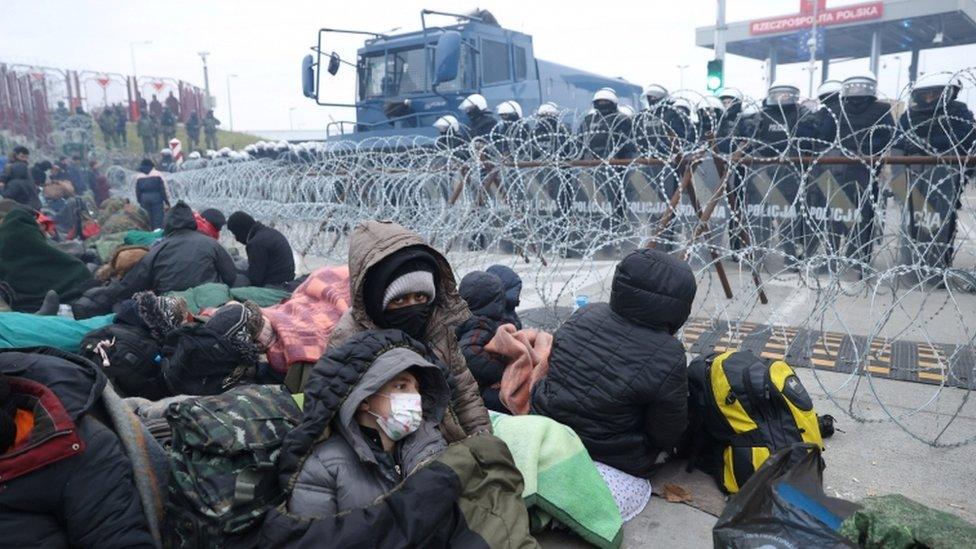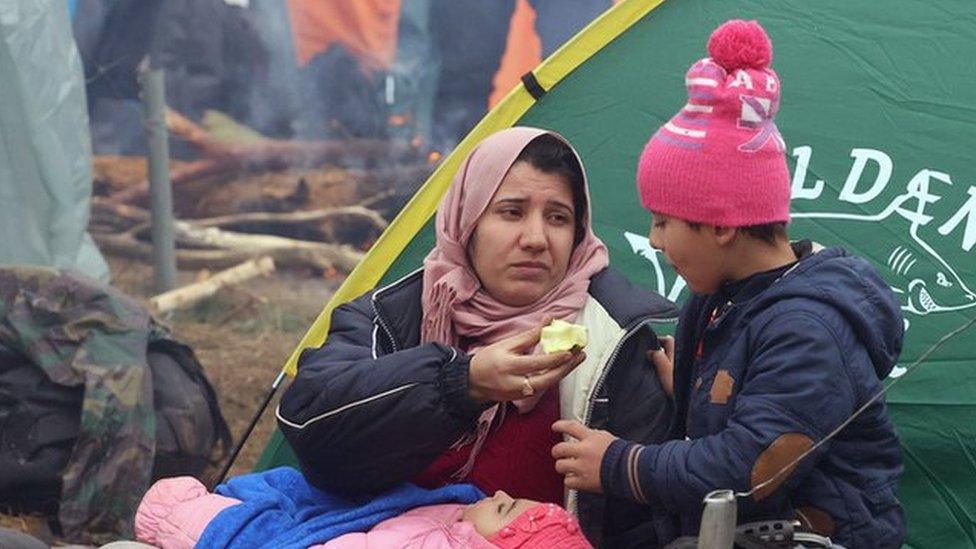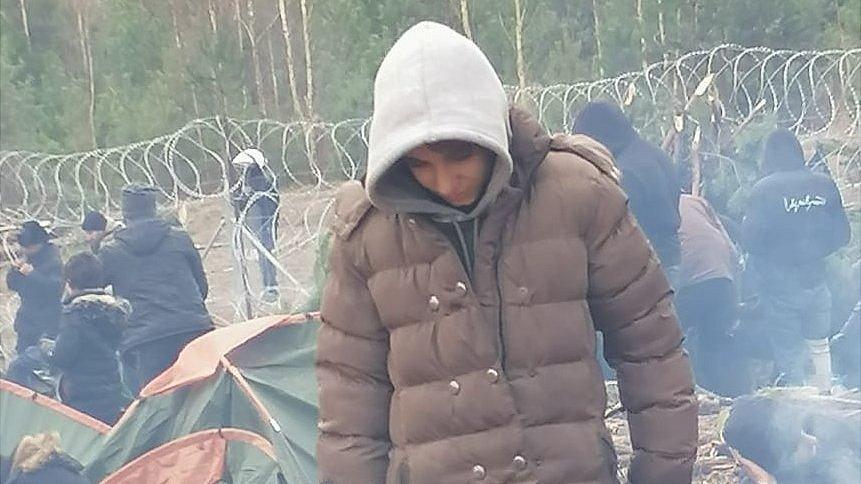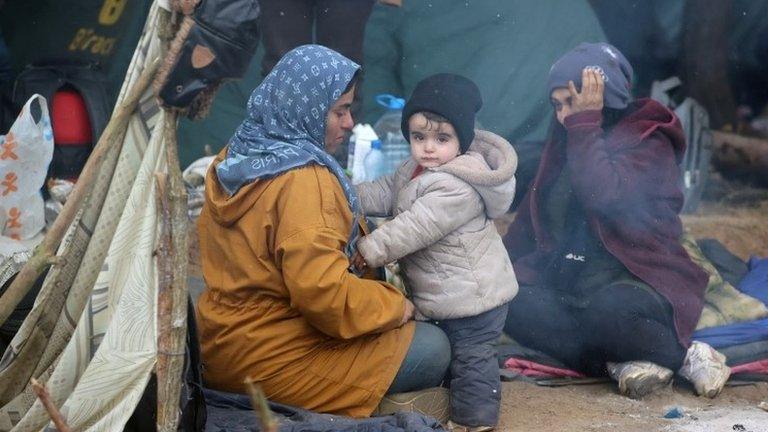Poland border crisis: EU to widen Belarus sanctions as row intensifies
- Published
The BBC's Steve Rosenberg: "A stand-off between the migrants on one side and the Polish police on the other"
The European Union is to step up sanctions against Belarus in response to an escalating migrant crisis on the border with Poland.
Top EU diplomat Josep Borrell confirmed the move, saying that vulnerable migrants were being exploited in a "hybrid war" that is "intensifying".
Belarus is accused of pushing migrants towards its borders to undermine security, a charge it denies.
On Monday, hundreds of migrants were blocked at a crossing by Polish troops.
A video filmed at the border by the BBC showed migrants sitting down on a road in front of barbed wire and Polish forces in a tense stand-off.
Those migrants came from a large makeshift camp at the Kuznica crossing, where thousands have settled in tents just inside Belarus.
"Goodbye!" called out a smiling girl, flashing a peace sign as she, and hundreds more, streamed towards the border, hoping to get through.
But they are trapped between Polish guards on one side and Belarusian guards on the other. The migrants cannot get into Poland, but are also being prevented from retreating back into Belarus, according to Polish authorities.
"All these babies are crying for milk, for nappies," one man was filmed saying to the line of heavily armed Polish guards. "We... have nothing, please come and help these people," he pleaded, speaking through the barbed wire from the Belarusian side.
The Polish border guard said it expected a forced attempt to breach the border, describing the presence of the Belarusian forces in the area as "worrying".
Humanitarian crisis
Since August thousands of men, women and children have amassed at Belarus's western border with Poland. They are mostly from Iraq, Syria and Yemen, and are now enduring freezing conditions in the hope of crossing into the EU.
The EU has accused Belarus of encouraging thousands of people to cross into Poland and other members states to spark a humanitarian crisis in the bloc.
"It's like a football game. We are in the middle," one woman told the BBC's Steve Rosenberg.
Hiding her identity with a scarf, she explained how Belarusian soldiers had helped some migrants cross illegally into Poland in the middle of the night by cutting the fence. But the migrants were founding hiding in a Polish forest, and sent back to Belarus.
Allow X content?
This article contains content provided by X. We ask for your permission before anything is loaded, as they may be using cookies and other technologies. You may want to read X’s cookie policy, external and privacy policy, external before accepting. To view this content choose ‘accept and continue’.

European officials have accused Belarus's authoritarian leader, Alexander Lukashenko, of orchestrating a scheme to entice migrants with the false promise of easy entry to the EU.
Calling the accusations "absurd", Mr Lukashenko's government has repeatedly denied it is sending migrants over the border in revenge for existing EU sanctions that were imposed in June.
EU-Belarus relations have been severely strained since Mr Lukashenko declared victory in a discredited presidential election last year and tried to silence dissent by cracking down on mass protests and arresting political opponents.
REALITY CHECK: What routes do migrants use to reach Minsk?
BEHIND THE SCENES: How social media posts fuelled the Belarus crisis
On Monday, he spoke to German Chancellor Angela Merkel for about 50 minutes, Belta state news reports. It is the first conversation Mr Lukashenko has held with a Western leader since last year's election. The pair reportedly discussed providing humanitarian aid to the migrants at the border.
At the same time, Russian President Vladimir Putin, a close ally of Mr Lukashenko, spoke to France's Emmanuel Macron for nearly two hours. While the leaders did not see eye-to-eye on how the crisis began, they agreed on the need for a de-escalation at the border, an adviser to Mr Macron said.
Mr Putin has been accused of being the main orchestrator of the crisis. The White House has called on him to use his influence over Mr Lukashenko to "cease its callous exploitation and coercion of vulnerable people", spokeswoman Jen Psaki said.

Pictures show many hundreds of migrants camped at the border, shivering through bitterly cold weather as they try to get into Poland
On Monday, EU foreign ministers held a meeting and agreed to move ahead with imposing more sanctions on Belarus - the fifth round of such restrictions.
The exact details will by confirmed later this week, but the Belarusian airline Belavia will be affected, with the EU ending its leasing contract with the company. Travel agencies are also expected to be sanctioned if they helped to fly migrants from the Middle East and elsewhere to Minsk.
On Monday, Mr Lukashenko threatened to retaliate against fresh sanctions. He claimed Belarusian authorities were trying to repatriate stranded migrants but many were refusing to go.

Are you near the border? Share your experiences by emailing haveyoursay@bbc.co.uk, external.
Please include a contact number if you are willing to speak to a BBC journalist. You can also get in touch in the following ways:
WhatsApp: +44 7756 165803
Tweet: @BBC_HaveYourSay, external
Please read our terms & conditions and privacy policy
If you are reading this page and can't see the form you will need to visit the mobile version of the BBC website to submit your question or comment or you can email us at HaveYourSay@bbc.co.uk, external. Please include your name, age and location with any submission.
Related topics
- Published11 November 2021

- Published13 November 2021

- Published12 November 2021
